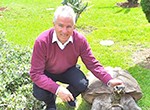 Captain Hawkeye Pierce of the 4077th MASH unit is one of the great fictional doctors. Battered by the US army, and brutalised by death and disfigurement in a war far from home, he made mistakes, he was human, he cared. We laughed, cried, and loved him. Alan Alda and the rest of the cast of MASH personified why the arts are important. For 30 minutes every week at the height of the Vietnam war, a worldwide audience reflected afresh on the futility of war. At its best, art forces us to see the world through others’ eyes.
Captain Hawkeye Pierce of the 4077th MASH unit is one of the great fictional doctors. Battered by the US army, and brutalised by death and disfigurement in a war far from home, he made mistakes, he was human, he cared. We laughed, cried, and loved him. Alan Alda and the rest of the cast of MASH personified why the arts are important. For 30 minutes every week at the height of the Vietnam war, a worldwide audience reflected afresh on the futility of war. At its best, art forces us to see the world through others’ eyes.
From the rarefied atmosphere of the World Cardiology Congress in Melbourne, I read how poorly we sometimes put the best of evidence into practice. This time it’s asthma, and, while deaths from asthma in many age groups are in fact falling, I inwardly sigh and know we can do better because this happened a few months ago . . .
A *patient, “Teacher” as I’ll call her, had her asthma well controlled on Symbicort. Well controlled, but not reviewed for three years, so no discussion of stepping down. Hoarseness and a sore throat began to develop and persisted. GP consultation one: probably viral (reasonable). But it gets worse. GP consultation two: must be viral, stay off work for two weeks. “Couldn’t it be something to do with the inhaled steroid?” asks Teacher helpfully. “No” says GP. GP consultation three: still hoarse, still off work, and the side effects from the codeine for the pain are worse than the pain. We’re now way over the “refer for laryngoscopy for persistent hoarseness” deadline in another guideline, but that doesn’t happen either. “I wonder if it could be your inhaled steroid” says the GP. He stops her Symbicort and starts fluticasone, increasing the steroid load on Teacher’s upper airway and larynx.
The story ends happily. By good fortune, Teacher had to move house and re-registers with her old GP practice. She takes the NICE “I’m persistently hoarse, refer me” guideline along and gets referred. She sees the asthma nurse and gets the steroid dose dramatically reduced with no loss of asthma control. She looks up vocal exercises on the internet and starts to turn the corner. The rapid indirect laryngoscopy is (joy of joy) normal. With a phased return to work, Teacher’s life returns to something that resembles normal. After three months.
There are many reasons why, despite our best efforts, things occasionally don’t go as well as we would hope. It’s definitely not down to lack of intelligence, commitment, or caring. I don’t meet anyone in the NHS who isn’t working their socks off. But as George Bernard Shaw wrote: “Success does not consist of never making mistakes, but in never making the same one a second time.”
In “Goodbye, Farewell, Amen,” the final two hour MASH episode watched by a record US TV audience, the uneasy truce holds and Hawkeye plans to return to his father’s practice and “get the good people of Crab Apple Cove to say ‘Aaaargh.’” So how would our hero, now a family physician, handle evidence, guidelines, and implementation?
I reckon he’d have understood that the time with which he had to keep up to date was limited, and that his own cognitive capacity was also limited. He’d have recognised the good sense in Slawson and Shaughnessy’s work, which recognises that first base is to be really up to date with the best available evidence for conditions that present commonly.
An hour a week on keeping up to date is realistic, such is the pace and volume of clinicians’ workload. For a GP, 30 to 40 conditions covers about two thirds of problems that present. So an approach might be to “hot-synch” our brains about once a year with short, trusted, public sector summaries of evidence—looking particularly for instances where we think we do one thing, but the evidence says we should change our practice. I bet Hawkeye would also check some audit data on those common conditions to see if what he thought he was doing was what he was actually doing. The GMC thinks that’s a good idea too.
Even without Hotlips Houlihan and Radar O’Reilly around, I reckon Hawkeye would be on the ball in Crab Apple Cove. It’s reasonable for doctors, all doctors, to be really good at treating the conditions they see commonly. It’s not going to fix all of our mistakes by any means, but it’s a logical, realistic plan, and it might sometimes prevent us feeling really bad about stuff that has gone wrong.
And thanks, Teacher. Patients’ experiences can work as well as the arts. You too made me see the world through another’s eyes.
*Permission was obtained from the patient “Teacher” in this blog.
Neal Maskrey’s early career was as a GP before spending seven years as a medical manager and part time GP. After 12 years as a director of the National Prescribing Centre and programme director at NICE, he is now honorary professor of evidence-informed decision making at Keele University, and consultant clinical adviser in the Medicines and Prescribing Centre, NICE.
Competing interests: I declare that I have read and understood the BMJ Group policy on declaration of interests and I hereby declare the following interests: Employed part time by the National Institute for Health and Care Excellence.